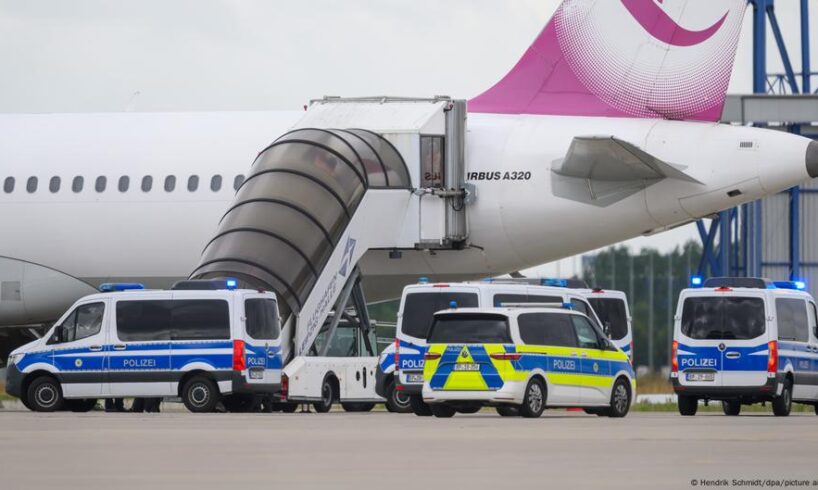
Mert Sayim works as a refugee, migration, and integration advisor for Diakonie, a charitable organization affiliated with the German Protestant Church. He often finds himself at airports in North Rhine-Westphalia (NRW), especially in the state capital Düsseldorf. From that city’s airport alone, more than 2,800 people were deported in 2024. These were people whose asylum applications had been rejected or who had committed a criminal offense and were found to pose a threat to public safety.
In 2024, over 20,000 people were deported from Germany.
Sayim’s job is to observe deportations on site and document any misconduct in the treatment of deportees. He knows the exact numbers. Since 2022, deportations have risen from just under 13,000 to over 20,000 per year.
That number has risen even more in 2025. According to the Federal Ministry of the Interior, 12,000 people have already been deported in the first half of the year. This means that Sayim will have even more work on his hands. What he sees is sometimes disturbing, but it is his job to document these incidents and share them with the world.
Mert Sayim and his colleague Judith Fisch spend a lot of time at airports observing deportationsImage: Christoph Bild/Diakonie RWL
Fresh out of heart surgery, and already on a plane
At the presentation of the current annual report by Diakonie, Sayim cited one such example: “We observed, among other things, the deportation of a child who had recently undergone heart surgery. And this took place without a medically required follow-up examination — even though it had already been scheduled.” Sayim says he would like to see more sensitivity and flexibility in such cases.
Diakonie’s report contains general recommendations: “When deporting sick persons, each individual case needs to be evaluated and monitored to determine whether that person does in fact have access to the necessary medical care in the destination country. It is important to consider whether the person can personally obtain, afford, and access the treatment.” It goes on to say that if there are significant health risks, the deportation must be suspended.
Deportations are rarely suspended for health reasons. However, there are other reasons too: For example, pilots occasionally refuse to fly if the deportees are aggressive. Safety on board for all passengers is a priority. This is also how the federal police, which is responsible for border security, sees the matter. Diakonie and the police have been working together for a long time in North Rhine-Westphalia.
“Deportation should not be carried out at any cost,” stressed Chief Inspector Andrea Hoffmeister from the press office of the federal police headquarters in Sankt Augustin. But he emphasized that all officers involved in deportations have been trained, in some cases through special training courses, and that there are special rooms set up at the airport for families and children.
A call for more transparency
Deportation observer Mert Sayim isn’t able to get a complete picture of how people who are being deported are being calmed down during their deportation. That’s because he can only see as far as the airplane’s gangway — which he thinks isn’t enough: “The monitoring of deportation measures needs to be expanded and structurally strengthened,” he says, calling also for more transparency.
Sayim believes that this should be enshrined in law at the federal and state level. In his opinion, regulations should also be put in place to allow the entire deportation process to be observed: “What we mean specifically is when people are picked up from their place of residence and during the flight.” Sayim says that this has been mandatory under aEuropean Union (EU) directive since 2008.
However, Germany is ignoring this directive and, together with other countries, is pushing for further tightening of the rules. In July, Interior Minister Alexander Dobrindt of the center-right Christian Social Union (CSU) invited his counterparts from Austria, Denmark, France, the Czech Republic and Poland to coordinate their positions. “Effective repatriation is an essential prerequisite for confidence in a balanced European migration policy,” reads their joint statement.
Pastor Rafael Nikodemus from the Diakonie Rheinland Westfalen Lippe, which also monitors deportations, has a different understanding of trust: “Transparency in this closed-off area benefits all institutions involved in the deportation process. It is important that governmental and non-governmental organizations share a common view of what is acceptable from a humanitarian perspective.”
Church asylum instead of deportation
Pastor Nikodemus also feels the effects of increasing political pressure and the socially polarized debate on migration in places where people threatened with deportation often find their last refuge: in churches. In 2024, there were 329 new cases in North Rhine-Westphalia, where individuals in danger of being deported were offered asylum in a church, says Nikodemus. “That was less than in the years before.”
The complicated matter of deportation
To view this video please enable JavaScript, and consider upgrading to a web browser that supports HTML5 video
This article was originally written in German.
While you’re here: Every Tuesday, DW editors round up what is happening in German politics and society. You can sign up here for the weekly email newsletter, Berlin Briefing.





